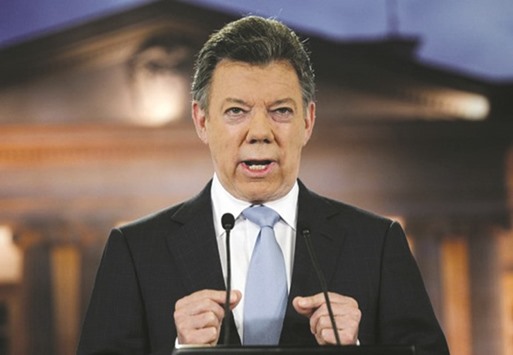President Juan Manuel Santos said a referendum would be held on a possible peace deal with Marxist Farc fighters, whether the rebels want a vote or not.
The Farc and the government have said they aim to sign a peace deal by March 23.
“Whatever gets signed in Havana, I will submit to a referendum vote, whether the Farc likes it or not,” Santos said in a Twitter post.
The Farc’s lead negotiator Ivan Marquez earlier had said he was opposed to the idea.
The talks, held in Havana, are believed to be nearing a long-sought deal to end Latin America’s longest-running insurgency.
Colombia’s biggest rebel force, the now 7,000-strong Farc has been fighting the government in Bogota for five decades.
Last week, the US pledged $450mn to fund Colombia’s peace process - if a deal is indeed signed to end the war that has left more than 220,000 people dead and displaced 6mn others.
Earlier Santos said the National Liberation Army, Colombia’s second-largest leftist rebel group, must release a civilian and a soldier held hostage before the government will agree to begin a peace process.
The two sides have been holding preliminary talks for more than two years.
The National Liberation Army (ELN) have been holding civilian Ramon Jose Cabrales, of eastern Norte de Santander province, for five months. Government soldier Jair de Jesus Villar was captured last week in Antioquia.
“We demand the liberation of corporal Villar and of citizen Ramon Cabrales,” Santos said after meeting with security officials in the city of Arauca. “If they (ELN) want to begin any type of negotiation they must liberate these hostages.”
The ELN set off six explosives, targeted at an army brigade, in Arauca on Monday. There were no injuries.
Farc leaders said that peace in Colombia would be “incomplete” if the ELN, which has about 2,000 fighters, does not participate in negotiations.
“The ELN cannot be left out of the peace process,” Farc head negotiator Ivan Marquez said.
Colombia’s government warned last week that time was running out to begin peace negotiations with the ELN.
The group has battled a dozen governments since it was founded in 1964 and is considered a terrorist group by the US and European Union. It has continued kidnapping and attacks on infrastructure even during the exploratory talks.
Once a virtual failed state, Colombia is increasingly seen as a pivotal player in Latin America and one of the region’s most dynamic and democratic countries.

Juan Manuel Santos
